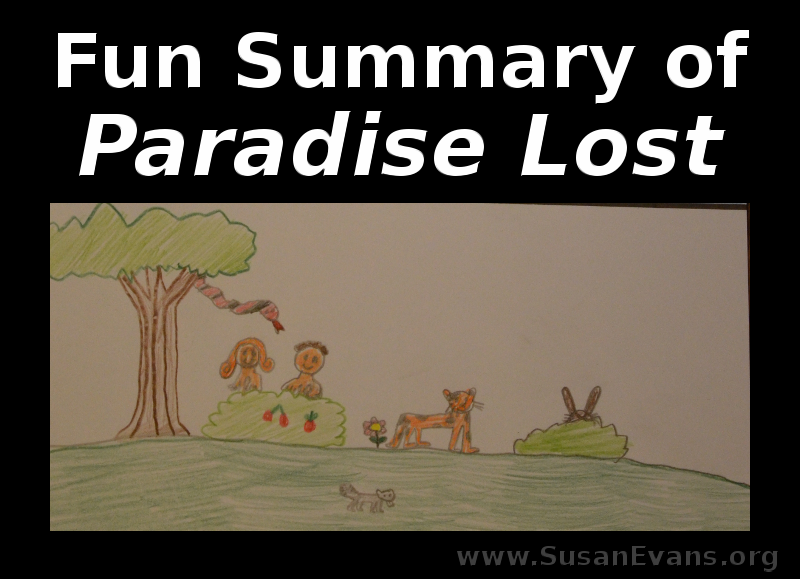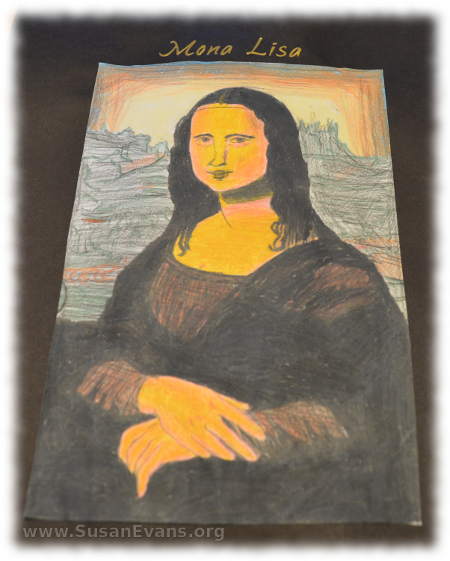My son Bryan wrote a fun summary of Paradise Lost by John Milton:
It all started when the #1 angel, Lucifer, made the most monumental miscalculation in the history of the universe. Somehow the most intelligent finite being ever actually thought he was more powerful than God! Next to infinity, all finite numbers look identical, so it blows my mind that he thought this. Not only that, but he got one third of all the other angels to believe him and tried to get a rebellion going.
This part of the poem is kind of silly. The good angels and the evil ones fought fiercely, until they realized their wounds healed almost instantly. They decided to call a truce to go back to their… tents? They slept through the night, because there’s nighttime in Heaven? I guess? Except team evil decided to spend the night inventing gunpowder. In the morning, they all got ready for battle. Team good drew their swords and team evil shot them with guns. But this turned out to be just as pointless, so they threw mountains at each other. Wait, there were mountains in Heaven? Jesus eventually grew disinterested in the aimless conflict, so He went to the middle of the battlefield and opened a trapdoor in Heaven under team evil, and they fell down into Hell.
In Hell, the demons built a large capital city called Pandemonium. From there, they decided to send Satan out of Hell on a reconnaissance mission. Meanwhile, God was creating the earth, the sun, the moon, and the stars. On the sixth day He made Adam, who wondered why he existed. God had him name all the animals, and he realized that there was more than one of each kind of creature, but he was the only human being in existence. Then God put Adam to sleep and took one of his ribs and formed it into Eve. Adam and Eve fell in love and lived in the garden of Eden. They could eat of any fruit in the garden except from the tree of the knowledge of good and evil.
Satan had disguised himself as a regular angel, but he acted rather strangely and was spotted from a distance by another angel. A warning was sent out that a spy was in their midst, and a division of angels was sent to find the impostor. God knew perfectly well what Satan was up to, and (spoiler alert) that Satan would manage to bring sin into the world by deceiving Eve; however, God decided (but isn’t He omniscient?) to let free will exist so people would have to chose Him over other things. Adam and Eve went to sleep, and Satan put dreams of eating the forbidden fruit in Eve’s mind while disguised as a toad. That’s when the angels found Satan and brought him to a high-ranking angel, and they argued for a while. Then Satan was forced to retreat.
Meanwhile, Adam and Eve woke up. Later in the day, an angel named Raphael came for a visit and told Adam almost everything that had happened in the universe up to that point. No kidding. It took all evening. Some of it was like this: “If you disobey God and eat from the forbidden tree, you’ll bring sin into the world, and lose Paradise, and one day you’ll die!” “I’ll never do that! I don’t want to lose Paradise!” Adam replied. (How does he know Paradise is a good thing? It’s all he’s ever experienced up to this point.) “Be sure to warn Eve about this,” advised Raphael.
After that, Adam and Eve went gardening, and Eve suggested they split up. “But Eve, if we split up, you might be tempted by the enemy to sin against God by eating the forbidden fruit!” (How do they know what sin is? They haven’t eaten the forbidden fruit yet.) “I would never listen to the enemy and eat the fruit! I would withstand the temptation!” argued Eve. “Good for you! But let’s not split up anyway,” counseled Adam. Eventually Eve convinced Adam they should split up.
Satan possessed a serpent which came up to Eve and said, “Why don’t you go disobey God and do what you specifically told Adam you wouldn’t do? (By the way, I’m totally not the enemy Adam specifically told you not to listen to.)” Eve thought to herself, “No innocent-looking 60-foot python’s advice could possibly be bad.” So she ate the forbidden fruit. Then she went to Adam and offered him a bite. Adam decided to die with her, and he ate it as well.
God came to the garden and asked, “Why are you hiding from me?” and Adam said, “We were afraid because we were naked.” “Who told you you were naked? Have you eaten the fruit from the tree of the knowledge of good and evil?” demanded God. “Eve did, then gave me a piece,” blamed Adam. “Well, this rather innocent-looking 60-foot python told me I should!” So God cursed the serpent on its belly, gave Eve pain in childbirth, and made the ground grow thorns. Also, they were to leave paradise.
But before that, Michael (another high-ranking angel) was sent to tell Adam about loads of stuff about the future like Noah and the flood. This conversation, once again, must have taken ages. After this, Adam and Eve were thrown out of Paradise.







